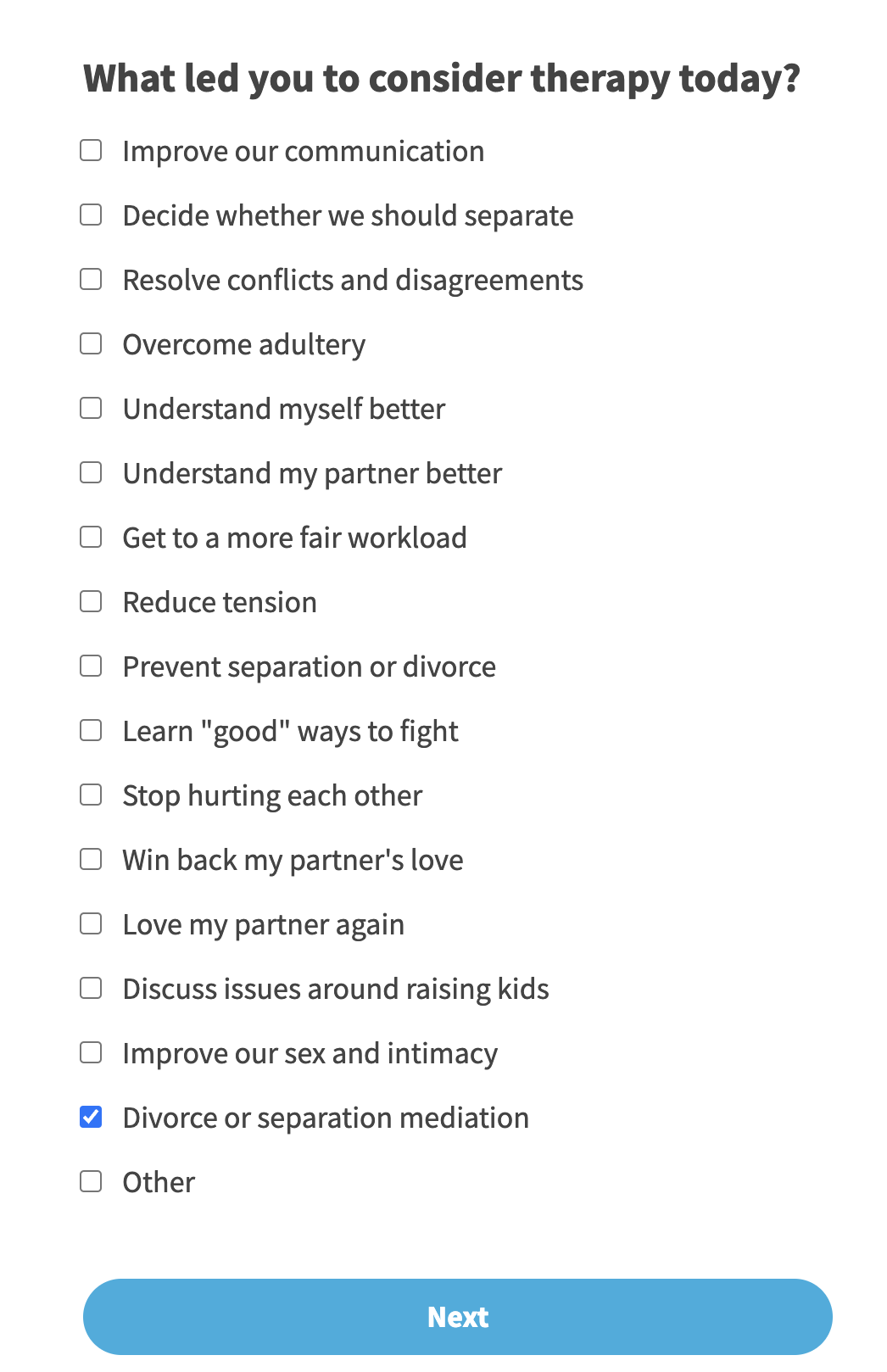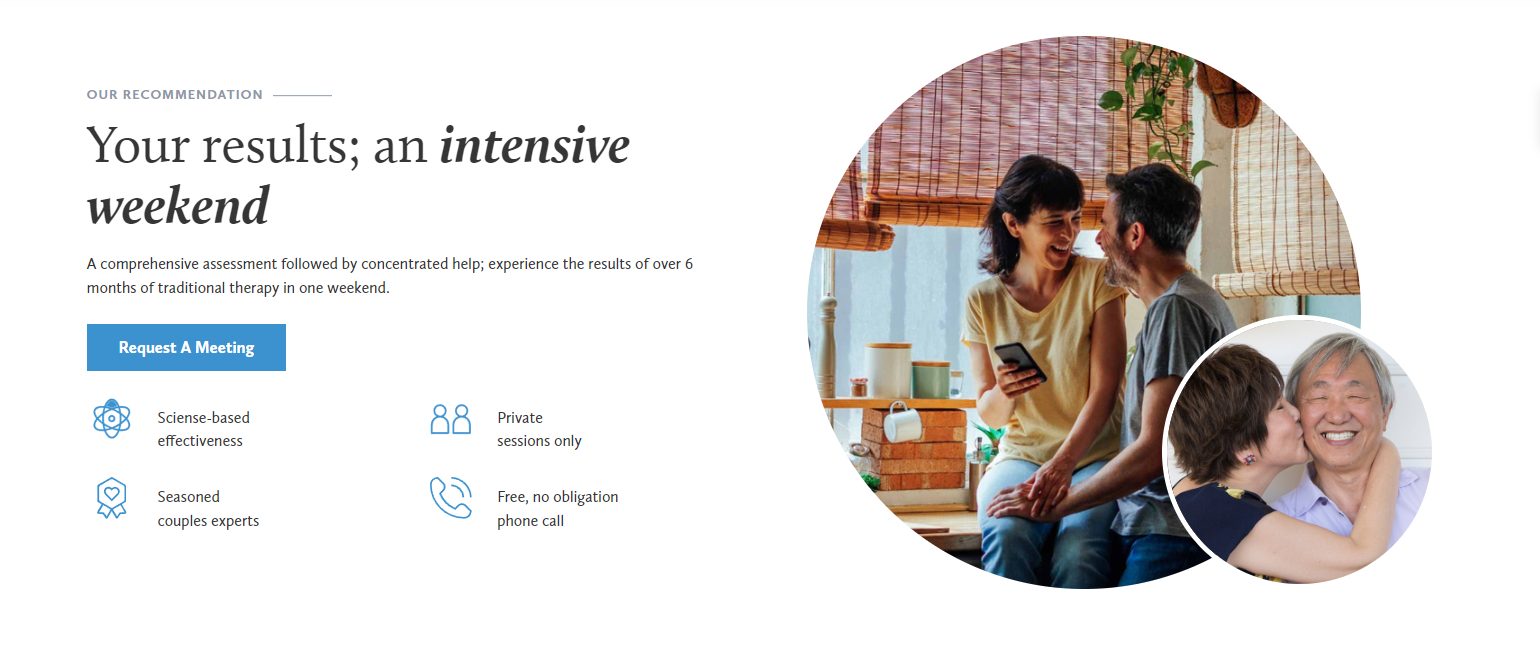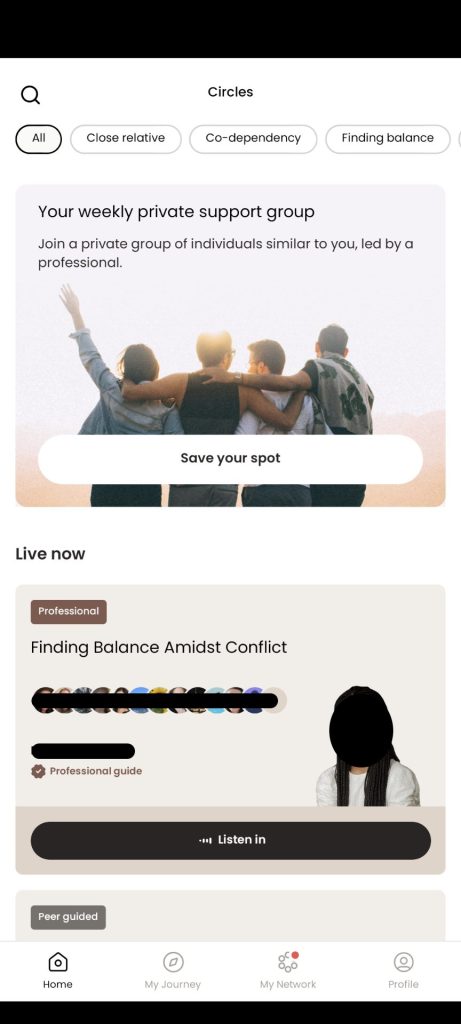Table of Contents
- We spent more than 10,000 hours researching over 70 online therapy platforms and our testers signed up for the 26 most popular platforms to bring you our top picks.
- Our testers use each platform for at least four weeks, focusing on the sign-up process, therapist selection, therapy session quality, and customer service interactions.
- We surveyed over 2,000 online therapy users, conducted focus group interviews with users and therapists, interviewed 30 online therapy users, and consulted over 60 mental health experts.
- We regularly update our content to reflect our ongoing testing of new platforms.
- To write this article, we personally tested each of the five platforms we recommend. We also talked to three experts on divorce counseling (two licensed therapists and a dispute resolution specialist).
- Learn more about how we tested online divorce counseling platforms.
Key takeaways
- ReGain is our top choice for online divorce counseling because it offers relationship-focused therapy with availability in many areas. Also, both partners can join under a single membership.
- Couples without insurance can expect to pay $200–$600 a month for online divorce counseling, though some platforms may be more expensive. With insurance, copays can be as low as $20 or less per visit.
- The online divorce counseling platforms we recommend offer a range of relationship services, including support groups, therapy for families going through a divorce, and discernment therapy.
- Divorce counseling is for people at any point on their divorce journey; discernment therapy is for couples deciding whether to pursue a divorce or stay together.
If you’re coping with divorce, managing your own emotions is only part of the process. Couples must also consider the logistics of separation and the well-being of any children or other family members affected by the relationship.
Online divorce counseling, which serves both couples and individuals, may offer an effective way to work through difficult issues such as co-parenting, finances, and feelings of grief or loss. Virtual sessions may be especially helpful for couples joining from separate locations.
We researched the top platforms for divorce and couples counseling and selected four of the best options for people considering or going through a divorce. Find out if one of these platforms will work for you.
Best online divorce counseling services of 2024
- ReGain: Best overall
- Talkspace: Best for using insurance
- Thriveworks: Best for families going through divorce
- Couples Therapy Inc.: Best for discernment counseling
Best online divorce support groups
- Circles: Best for online divorce support groups
Data privacy on mental health platforms
In addition to understanding how your data is collected and used before signing up for a platform, we recommend the following basic steps that we learned from the U.S. Department of Health and Human Services (HSS) and Mozilla Foundation’s *Privacy Not Included project:
- Attend your online therapy appointment in a private location, preferably not on a public Wi-Fi network.
- Use your personal computer when possible.
- Look out for checkboxes during sign-up to opt out of data tracking or medical information disclosure.
- Sign up with your email, not using a social login like Facebook.
- Choose a strong password to create a secure account login.
- Review the platform’s privacy guidelines and HIPAA regulations carefully before starting with a provider.
ReGain: Best overall
Why ReGain is our pick for best overall
ReGain’s standout feature is the availability of its therapists. For couples looking for divorce counseling, you have to coordinate schedules, making appointment flexibility and availability an important consideration. Our tester couples found it easy to book appointments at times that were convenient for both partners. They were also impressed by the quality of the therapists they were matched with. ReGain is our top pick for couples therapy in our best online therapy review as well.
Who may like ReGain: People who are seeking divorce counseling and need to find a therapist with weekend and evening availability. ReGain offers divorce counseling for both individuals and couples.
Who may want to avoid ReGain: If you need to pay for therapy with insurance, ReGain may not be for you. Our testers love the webinars offered by ReGain, but group experiences aren’t for everyone. Some people seeking divorce counseling may prefer to stick with one-on-one counseling.
Here’s how to get matched with a relationship or divorce counselor on ReGain:
- Answer the intake questions, starting with who you’re seeking therapy for (yourself, yourself and a partner, or “not sure yet”). You’ll be asked to share your age, gender identity, and relationship status. We like the inclusivity of these questions. For example, “How do you identify?” offered ten possible responses, including “Bi or Pan,” “Questioning,” and “Asexual.”
- Next, you’ll answer questions about your therapy goals and what you’re looking for in a therapist. Here, you can select “divorce or separation mediation,” which will help to match you with a therapist experienced in this area.
- If you’re signing up for couples therapy, you’ll be prompted to invite your partner to the platform via email.
- Finally, you’ll answer a question about the specific areas you’d like your therapist to focus on, such as “guilt and shame” or “divorce and separation.”

The last step is to sign up for a ReGain subscription and get matched with a therapist. If the therapist you’re matched with doesn’t have adequate experience in divorce counseling, or you don’t feel comfortable with the match, you can request a new provider. According to our tester, switching therapists was an easy process.
ReGain tester and user insights
Our testers had a positive experience signing up for the platform and finding therapists with evening hours, which was the only time they could meet due to their work schedules and childcare responsibilities.
Though our testers didn’t feel a connection with the first therapist they were matched with, switching therapists was simple and they quickly found one they liked. The quality of each session was high, according to our testers, and they were impressed that the therapist “sent messages between appointments checking in and sending thoughts and ideas.”
Though ReGain doesn’t take insurance, our testers discovered that ReGain offers a financial discount to eligible clients. People who identify as low-income in the intake questionnaire (and subsequently fill out a financial aid application) may receive as much as 30 percent off services, which comes to $252 per month, or $63 per week.
From one of our ReGain testers:
“Availability was great. We were able to find a therapist that seemed like a good fit and had evening hours that same week. I also like that there were tons of therapist options to choose from once we indicated that we wanted to switch therapists.”
Of the 100 ReGain users who responded to our February 2024 ReGain survey, 60 percent had children they regularly provide care for. Co-parenting and helping children to navigate divorce can be common concerns for people seeking divorce therapy. According to William Schroeder, licensed professional counselor (LPC) and founder of Just Mind in Austin, Texas, “Communication, expectations, and secure attachment” are essential in this process. Divorce counseling with a focus on co-parenting solutions can help families to adjust and thrive during divorce.
From one of our experts:
“If a family gets a divorce but the parents continue living together and get along better, it can actually be better for their kids. Or maybe they live around the corner from one another and resolve not to fight and focus on their underlying friendship and roles. When kids feel securely attached to both parents, the loss of the parents being a couple may not be that big of a deal.”
-William Schroeder, LPC, NCC
Read our in-depth ReGain review for more information.
Talkspace: Best for using insurance
Why Talkspace is our top pick for using insurance for online divorce counseling
Talkspace gets high marks from our testers for its ease of use—you can find out if the platform takes your insurance before you even create an account, and it’s simple to sign up. In addition to individual therapy, Talkspace also offers therapy for couples, and the intake questionnaire does a good job of screening for specific relationship issues, like divorce, separation, or adultery.
Who may like Talkspace: Couples who are looking for divorce counseling and need to pay with health insurance may find affordable per-session fees through Talkspace.
Who may want to avoid Talkspace: The platform offers 30-minute sessions for out-of-pocket subscriptions (people paying with insurance get 45 minutes), which may not be enough time for some couples to effectively work through issues.
To get matched with a therapist who provides divorce counseling, you’ll need to answer intake questions about why you’re seeking couples therapy. Options include “improve our communication,” “decide if we should separate,” “overcome adultery,” and “divorce or separation mediation.” We like that the user can choose more than one of these responses.
After you complete the intake questionnaire, you’ll be matched with a therapist. Like ReGain, if the therapist you’re matched with doesn’t have the experience you need or doesn’t feel like a good match, you can switch therapists.
Talkspace tester and user insights
Our testers felt that the Talkspace platform matched them well with therapists who met their needs. Booking appointments on Talkspace was easy, and they were impressed with appointment availability, which includes next-day appointments.
According to their website, Talkspace employs more than 5,000 therapists, including licensed marriage and family therapists (LMFTs), licensed clinical social workers (LCSWs), and clinical psychologists. This large selection of therapists may make it easier for users to find the right mental health professional with appointment times that fit their schedules.
By contacting customer service, we learned that sessions for people paying out of pocket are only 30 minutes long. But for couples and individuals using insurance to pay, you can select 30-minute or 45-minute sessions. While our testers were concerned that 30-minute sessions may be too short, they did find that these were easier to schedule than 45-minute sessions.
From one of our Talkspace testers:
“I like that we were paired based on my preferences and concerns. I was matched with a provider who matched my gender preference and had 10-plus years of experience in the topic I wanted to discuss.”
For couples using divorce counseling to address concerns such as co-parenting, 30–45-minute sessions may be adequate. Couples working through communication issues or trying to overcome adultery may need longer sessions. In this case, Talkspace customer service recommends booking two 30–45-minute sessions back-to-back for two longer sessions every other week instead of one 30–45-minute session each week.
From one of our experts:
“Many couples therapists do 90–120 minute sessions since there is often a lot to go through. This can be really helpful in case bombs go off so you have time to address them and not leave with both people hurt. This might mean going every other week instead of weekly.”
–William Schroeder, LPC, NCC
When you sign up for Talkspace sessions (regardless of whether you’re paying with insurance or out-of-pocket), you gain access to the platform’s bonus features, which include virtual workshops and daily exercises. Several workshops have topics that are relevant to people seeking divorce counseling. For example, the “Fighting Fair” workshop guides couples through strategies for navigating conflict.
Our tester accessed the following 5-minute exercises using their Talkspace app:
- Navigating the negative.
- Focusing on a single task.
- Sensory awareness.
- Overcoming worry.
- Deep breathing.
- Understanding past experiences.
In our February 2024 survey of 100 Talkspace users, 90 percent report having positive interactions with their therapist and 85 percent say the platform is intuitive and easy to use. Our October 2023 survey of 600 online therapy users showed that 34 percent of Talkspace users paid out of pocket, 32 percent used insurance, 10 percent used HSA/FSA cards, and the rest used other forms of payment, such as employee assistance programs (EAPs).
Read our in-depth Talkspace review for more information.
Thriveworks: Best for families going through divorce
Why Thiveworks is our top pick for families going through divorce
We like Thriveworks because it allows you to choose your own provider by using a variety of filters, including visit type (in-person or virtual), clinician gender, language spoken, and more. Families seeking divorce support can easily search for family therapists who specialize in divorce and related issues. You can even search for providers by the type of insurance they accept.
Who may like Thriveworks: Families seeking divorce support who need to pay with insurance will appreciate the Thriveworks directory. This is also an option for families who want the option of both virtual and in-person appointments.
Who may want to avoid Thriveworks: Because Thriveworks’s out-of-pocket fees are higher than other virtual counseling options we reviewed, this platform may not be a good fit for people without insurance.
You don’t need to create an account to search this platform’s large directory of providers, though you’ll need to log in to book an appointment. Start by choosing “Family Therapy” from the therapy types listed on the main page. From there, you’ll be directed to the Directory. At the top of the Directory, list your location, the specialty you’re seeking (“divorce/breakup” is an option), and your insurance. Before hitting Enter, change the filter in the top left corner from “Individual Counseling” to “Family Counseling.”

Thriveworks tester and user insights
Family therapy is one of the platform’s primary offerings, with a directory that connects users with providers who offer virtual (and sometimes in-person) appointments. In family therapy, families can set relationship goals and work on coping strategies to help everyone manage the sometimes difficult emotions that come with divorce. This can be especially important for families with children going through divorce. For families who want to learn healthy ways for adapting to the changes brought by divorce, family therapy could help with the details of co-parenting and the new schedules that come with a separation. For families who are struggling emotionally as a result of a divorce, family therapy could be an important venue for airing and working through difficult emotions in a safe space.
From one of our experts:
“Divorce affects all families differently, some families are incredibly relieved that the ongoing and entrenched conflict is over. Therapy can help folks in families like this to grieve, adjust, and move forward. Other families fit the stereotype that divorce is really hard on everybody, with the divorce being so contentious that everyone in the family is traumatized. Having a safe therapeutic environment is crucial for deconditioning the nervous system from chronically predicting and processing the fighting/fleeing/freezing that goes along with high conflict scenarios.”
– Brian Tierney, PhD, licensed psychologist
While the Thriveworks directory includes more than 2,200 providers, including licensed marriage and family therapists (LMFTs) and licensed clinical social workers (LCSWs), family therapy is not available in every state. At the time of testing, the states with the most availability for family therapy were Florida, Pennsylvania, North Carolina, and South Carolina. Our testers noticed that Thriveworks does not list “Family Counseling” as an option in Alabama, California, Maine, Minnesota, Missouri, New Mexico, and Oregon.
In states where family therapy is available, therapist availability varies. In North Carolina, our tester found same day and next day appointments. In Colorado, there was a 2–3 day wait for appointments. In Alaska, the wait for an appointment with a family counselor was 4–5 days.
From one of our Thriveworks testers:
“The booking process was super easy! I chose a therapist that had the specialties I was looking for and they had plenty of availability both before, during, and after working hours. I was able to book an appointment for the next day.”
For individuals, couples, or families seeking mental health support beyond their therapy sessions, Thriveworks offers free Fireside Courses. Each course is designed by a mental health professional and includes several 15–20-minute videos on a specific topic. We found several Fireside Courses on relationship issues, including Thriving After Divorce.
Read our in-depth Thriveworks review for more information.
Couples Therapy Inc.: Best for discernment therapy
Why Couples Therapy Inc. is our pick for best discernment counseling
Discernment counseling, which helps couples who are considering a divorce decide on the best path forward, is one of Couples Therapy Inc.’s primary offerings. A 2020 study on the impact of discernment counseling found that participants experienced greater clarity around the decision to divorce and felt discernment counseling offered a helpful structure for the decision-making process. Participants also reported that discernment counseling helped them navigate co-parenting.
Couples Therapy Inc. offers couples the chance to start the work of discernment in a focused, intensive retreat format, either virtually or in-person. The website claims that this approach helps couples get results and make decisions more quickly.
Who may like Couples Therapy Inc.: Couples who have been trying to decide whether they should divorce or separate but aren’t making progress in traditional therapy may benefit from an intensive couples retreat.
Who may want to avoid Couples Therapy Inc.: This platform isn’t for people who are on a tight budget or need to use insurance to pay. Couples Therapy Inc. may not be a good fit for people who have already made the decision to end their marriage.
On Couples Therapy Inc., the first step is an intake quiz that takes about five minutes to complete. You’ll be asked about your relationship status, the health of your relationship, and how invested you and your partner are in couples therapy. After completing the quiz, the platform will recommend a course of action. Our testers received recommendations for a “last chance” intensive weekend retreat, and “hopeful spouse coaching” (individual support for marriage issues).
The next step is to request a consultation, which our testers found could be scheduled for as early as the next day. The consultation is a 15-minute call with a Couples Therapy Inc. representative and is free. After this call, you can schedule a free meet-and-greet with your therapist. While you must complete a consultation call to get started on this platform, you can ultimately choose your own therapist (either through the consultation call or by browsing therapist profiles on the website). Our testers found therapist availability varied greatly by location, with one tester unable to find a therapist in their home state of Alabama (though they had the option to drive one state over for a weekend in-person retreat). This tester also discovered that there were no therapists of color to choose from in their state.

Couples Therapy Inc. tester and user insights
Here are all of the services offered by Couples Therapy Inc., and how they work:
- In-person or online intensive retreats: Couples Therapy Inc. holds virtual and in-person retreats. In-person retreats are held in 33 locations in the United States, including Puerto Rico. The platform offers online retreats in 45 states and is also available internationally in Canada, Great Britain, Northern Marina Islands, and Singapore. After you are matched with (or choose) a therapist and pay for your retreat, you’ll need to complete an extensive questionnaire called The BIG BIG Book. The BIG BIG Book typically takes three to six hours to complete and is used to help your therapist better understand you and your partner during the retreat. You can choose to focus on discernment therapy or another type of therapy during your retreat.
- Follow-up sessions after retreat: Couples who complete an intensive in-person or online retreat are eligible for virtual couples counseling. The price for follow-up sessions varies by provider.
- Individual coaching sessions: Couples Therapy Inc. also offers individual coaching sessions for people who want to do solo work on their relationship before entering couples therapy. Sessions start at $150 per 55-minute session, depending on the therapist’s availability and specialty.
- Other resources: Couples Therapy Inc. offers a free self-guided couples therapy course and a blog with helpful information for couples.
From one of our Couples Therapy Inc. testers:
“On the website, you can see the bio and credentials of each therapist. I really like that you can see past client feedback as well. So although I couldn’t book online before my discovery call, I was able to have a good idea of who I wanted before my call.”
If you need group support for divorce
Circles: Best for online divorce support groups
Why Circles is our pick for online divorce support groups
Our tester was impressed with the level of support available through Circles. While not all support circles are led by licensed therapists, our testers found most of the peer-led support groups to be helpful and engaging.
Who may like Circles: This app is a great low-cost option for people seeking professional and peer support in a virtual group setting.
Who may want to avoid Circles: While Circles offers a support community, it is not therapy and should not be used to replace treatment for mental health issues. This is also not a good venue for couples seeking discernment counseling, as the focus is on supporting people affected by divorce or narcissistic relationships.
The Circles app is easy to use and anyone can join. While this feature promotes a diverse community, it could also create privacy issues. To protect your privacy, you can join support circles anonymously or choose a username other than your real name and decide whether or not you want to use a profile picture.
Safety and privacy on Circles
Online group platforms like Circles may have open sessions for anyone to join and share. Not all online platforms verify the identities of their users, so it can be up to the community to report malicious activity and users that make others feel unsafe. Online platforms, including Circles, often have a “Report User” feature to help keep their community safe.
In addition, Circles customer service recommends not sharing your personal contact information with anyone and only sharing your real name and profile picture if you’re comfortable with it. You can read Circles’s user agreement here.
You can also report unsafe online activity or threats to your local police department. If you’re having an emergency, however, call 911.

From one of our Circles testers:
“Using Circles, I learned the huge benefit of connecting with others who have similar experiences. The app created a safe space where I could share my thoughts and feelings and gain insights from both mental health professionals and peers. I really enjoyed the audio-only sessions, which allowed for intimate and focused conversations without the pressure of being on video.”
While we had an overall positive experience with the divorce support groups provided by Circles, there are a few things we didn’t love. The peer-led support groups, which users can start at any time, are great for providing 24/7 support on the program. However, a few of the peer-led groups felt a little chaotic and sometimes discussions went off track without a moderator to help lead the conversation.
Our testers also encountered some technical difficulties with the app, including faulty audio during some of the sessions and a few glitches during the sign-up process.
Online divorce counseling platforms to avoid
The Growing Self platform offers various services, including divorce counseling (which they call “Heartbreak Recovery”). The initial 30-minute consultation on Growing Self is free; after that, per-session fees vary based on the provider’s experience and credentials. Coaches with a master’s degree in counseling psychology charge between $85 and $125 per session, licensed mental health clinicians charge $105–$145, and clinicians with doctoral degrees charge $170 per session. All sessions are 45 minutes. Insurance is not accepted.
Our testers feel that the website is just too confusing and difficult to navigate. We also discovered that the platform’s appointment availability for licensed clinicians was extremely limited, which is why we don’t recommend this platform for divorce counseling.
How we test and choose the best online divorce counseling platforms
The Handbook Team has researched over 70 online individual and group therapy platforms, directories, and networks. We identified 10 popular online divorce counseling platforms and compiled our results based on weeks of testing and research. We then tested these platforms for at least four weeks. We looked for platforms that offer expert guidance in various formats, including divorce therapy, discernment therapy, and individual and family support for people who are experiencing divorce.






Firsthand testing experience
Testers explored the platforms and attended online therapy sessions for at least four weeks. Our testers were instructed to test the platforms through the lens of a real user, paying attention to how easy or difficult it was to find a therapist they could talk to. Additionally, testers were located throughout the United States, allowing us to gauge the availability of providers in different locations. Testers logged their experience in a diary and came together to share their findings when testing concluded. While we ask our testers not to share personal information or diagnoses, their testing notes offer a nuanced view of how each platform approaches and delivers online divorce counseling.
Online therapy surveys
We received survey responses from over 2,000 online therapy users in varying age groups. These surveys asked current users of ten of the most popular online therapy and online psychiatry platforms to evaluate each service. Their feedback taught us how users leverage each platform’s unique features and helped us learn how users feel about important issues, such as data privacy. Respondents included those going through divorce and those seeking couples and divorce counseling.
Focus groups
We hosted focus groups of practicing online therapists and current online therapy and psychiatry users to understand what each group values on their side of the screen. We asked the therapists about the pros and cons of teletherapy and learned which factors influence online therapy and psychiatry users to choose one platform over another.
Our online therapy and psychiatry rating indexes
We created a unique rating index to see how varying platforms measure up to four key factors:
- Affordability: We looked for platforms with affordable out-of-pocket prices. We also included counseling services that accept insurance or offer financial aid.
- Data privacy: We examined how each platform collects and handles user data. If a brand didn’t have this info available on their website, we reached out to learn from them directly.
- Therapist availability: We collected data on a brand’s total number of in-network therapists and their appointment availability in different states.
- Inclusivity: We evaluated platforms on their inclusivity and diversity of practitioners. We also noted if a platform allows users to filter therapists by ethnicity or gender identity.
Mental health experts
A group of mental health professionals—including a licensed psychologist and a licensed professional counselor (LPC)—offered insight on online therapy platforms for this article, helping us to ensure that it contains up-to-date information and expert knowledge on divorce counseling and couples therapy.
From our expert
From one of our experts, on whether couples should engage in online divorce counseling from the same location (same screen) or from separate locations:
“[Being in the same room] gives more data to the therapist about how the couple behaves around one another. Body language can tell you what words cannot. That said, if a couple is separated or tends to have toxic fights, it’s possible that separate locations may be helpful. Many therapists assess clients before beginning to better understand the dynamic of a couple and the strategy that will be employed to help them with their specific challenges.”
–William Schroeder, LPC, NCC
Learn more about our online therapy testing and review methodology.
Our online divorce therapy testing process:
In a mental health emergency
Online therapy may not be the most appropriate resource to help in a mental health crisis. If you or someone you know is a danger to themselves or others, it is an emergency and cannot wait for a group session or an online therapist’s response. Don’t wait. You can find help immediately by:
- Calling 911.
- Visiting your local urgent care or emergency room.
- Calling or texting 988 for the Suicide & Crisis Lifeline.
- Chatting online at 988lifeline.org.
- Calling the Substance Abuse and Mental Health Services Administration’s (SAMHSA) Helpline at 1-800-662-4357 or texting your zip code to 435748.
All the above options will connect you with trained professionals who can provide crisis support. You can find even more resources, including international options, on our helpline directory page.
What is online divorce counseling?
Divorce counseling is a therapeutic process that aids individuals or couples in moving through the emotions of a divorce. People can engage in this process before, during, or after a divorce. In divorce counseling, couples may address some of the following issues:
- The division of assets, such as a home, pets, or belongings.
- Co-parenting, including helping children to navigate the difficult emotions that often come with divorce.
- Strategies for communicating respectfully and managing conflict.
- How to find closure and move forward.
According to Brian Tierney, PhD, couples in divorce counseling “are given the tools to act more respectfully and to communicate better through the divorce process, as well as to unburden themselves from resentments—something especially important for those who will continue to co-parent after the divorce.” Divorce counseling can take place online or in person.
Discernment counseling is different from divorce counseling in that it offers couples who are considering divorce the option to decide whether or not they want to stay together. This type of counseling may be helpful for couples who are dealing with adultery or other difficult relationship stressors but feel their marriage is still worth saving.
Our final verdict
ReGain is our pick for the best online divorce counseling due to the quality and availability of providers who specialize in divorce, which impressed our testers. We recommend Talkspace for couples who need to use their insurance to pay for divorce or couples therapy. Thriveworks is a great option for family therapy related to divorce, and Couples Therapy Inc. is our recommendation for couples who are considering divorce and need help finding a way forward. Circles is our top pick for virtual divorce support groups.
The support of mental health professionals, as well as peers who are experiencing divorce or separation, can help you to feel less alone as you make difficult decisions and navigate challenging emotions around divorce. Take your time choosing an online divorce therapy provider or platform that meets your needs. “Shop around,” Tierney advises. “It’s all about your connection with the therapist. Divorce counselors can’t be pushovers, they need to have a good combination of fierceness and compassion.”
Compare the best online divorce counseling platforms of 2024
| Best for | Online couples counseling for individuals and couples | Using insurance | Families going through divorce | Discernment therapy | Individual divorce support |
| Divorce-related services | Online individual and couples counseling for relationship issues | Individual therapy, couples and relationship therapy, discernment counseling, co-parenting therapy | Individual therapy, couples and marriage counseling, child & teen therapy, family therapy | Online and in-person couples retreats, online therapy, individual therapy | udio-only and chat-based support groups for divorce-related issues |
| Cost | $260–$360 per month | $276–$436 per month, or the cost of your copay | Varies by provider | $3,500–$7,000 for retreats; online sessions start at $150 | Starts at $29 per month |
| Accepts insurance | No | Yes | Yes | No | No |
Frequently asked questions
Some online therapy platforms, like Talkspace, may accept insurance for divorce counseling and couples therapy. If the provider or platform you want to use does not take your insurance, you can file out-of-network claims with your insurance carrier. Also, ask your therapist if they will provide a super bill (receipt) to submit to the insurance company.
In some cases, a judge will require a couple to attend counseling sessions as part of their divorce settlement. Even if divorce counseling isn’t legally required, it can be a helpful way to address co-parenting approaches, manage the details of a separation, and work on respectful communication.
In online divorce counseling, couples meet with a therapist virtually from the same or different locations. These sessions can help couples learn new ways to communicate as they move through the divorce process.
- Office for Civil Rights. (2023, October 17). Telehealth Privacy and Security Tips for Patients. U.S. Department of Health and Human Services. Link
- Emerson, A.J., Harris, S.M., & Ahmed, F.A. (2020, November 6). The impact of discernment counseling on individuals who decide to divorce: experiences of post‐divorce communication and coparenting. Journal of Marital and Family Therapy, 47(1), 36–51. Link


















